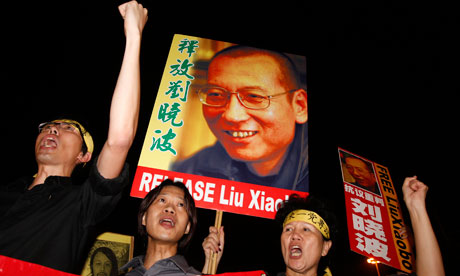Chinese human rights campaigners celebrate as Liu Xiaobo wins Nobel peace prize
![]()
Jailed dissident’s award gives campaigners ‘happiest day in years’ but Chinese government calls decision ‘blasphemy’
Tania Branigan in Beijing

China’s human rights campaigners were celebrating the “happiest day in years” today as the jailed dissident Liu Xiaobo was awarded the Nobel peace prize. But the Chinese government reacted in fury, describing the decision as a “blasphemy”.
The Nobel committee said it was recognising the 54-year-old author’s “long and non-violent struggle for fundamental human rights in China”, adding that it had long believed there was a close connection between human rights and peace.
Beijing warned the decision could harm ties with Norway – where the awards are based – and summoned Oslo’s ambassador to make a formal protest.
Liu is serving 11 years for incitement to subvert state power after co-writing Charter 08, a call for democratic reforms in China. Human rights campaigners have complained of a broader drive against lawyers and activists recently.
“This is the happiest day in years … 1.3 billion Chinese should not live in an environment where human rights are being violated,” said Mo Zhixu, a friend of Liu’s and Charter 08 signatory. Li Hai, another signatory, added: “This is the best gift from the international community to the Chinese people. I hope we can now see some progress in the political system.”
China argues it has no dissidents; only people who break the laws. Today’s statement by foreign ministry spokesman Ma Zhaoxu denounced Liu as a criminal and said his award was a “blasphemy to the peace prize”.
Security officers did not allow Liu’s wife Liu Xia out of her apartment to speak to reporters. In a statement released via a campaign group, she said: “It is a true honour for him and one for which I know he would say he is not worthy.” She added that police had offered to take her to Liu’s prison in north-east China, apparently to prevent her from talking to foreign reporters. “They are forcing me to leave Beijing,” she told Reuters by phone. “They want me to go to Liaoning to see Xiaobo. They want to distance me from the media.”
But she said that if they were telling the truth she would at least be able to see her husband and tell him he had won.
While Liu’s supporters welcomed the news, they acknowledged the battle for reform was still extremely difficult.
Few outside intellectual circles have heard of the author and former academic. “I don’t know about his work so I can’t say whether he deserves the prize or not,” said a salesman passing the dissident’s home.
Screens showing the BBC and CNN went blank in Beijing as news of the announcement broke. Earlier, in a sign of the authorities’ nervousness, several major news portals had removed pages devoted to Nobel awards.
Nicholas Bequelin, Asia researcher at Human Rights Watch, said: “Their top concern is the domestic impact and the fact millions of people may look to see ‘Who is Liu Xiaobo and what is the content of Charter 08?’.”
He added that the award might allow moderates in the government to push back against hardliners. “The reason Liu Xiaobo has a Nobel prize is because Chinese leaders decided to break the status quo – he was under surveillance but basically allowed to pursue his activities – and jail him to make an example of him and scare others. That has spectacularly backfired. People are bound to ask whether this was worth it.”
Liao Yiwu, a fellow dissident and one of Liu’s closest friends, said he was thrilled, describing the award as “a big moment in Chinese history” which would encourage other campaigners.
Around a dozen friends and supporters of Liu were taken away by police after holding a small demonstration outside a Beijing park, holding up signs congratulating him and shouting: “Long live freedom of speech, long live democracy.”
Barack Obama, who won the prize last year, welcomed the news. He urged China to release Liu and respect human rights.
He said: “Last year, I noted that so many others who have received the award had sacrificed so much more than I. That list now includes Mr Liu, who has sacrificed his freedom for his beliefs. The Nobel Committee has chosen someone who has been an eloquent and courageous spokesman for the advance of universal values through peaceful and non-violent means.”
The Dalai Lama – who won the prize in 1989, again to the anger of Beijing – was also among those who congratulated Liu.
Another peace laureate, Desmond Tutu, joined Vaclav Havel and several others in nominating the author.
In Norway, the Nobel Committee chairman Thorbjoern Jagland told Reuters China should be under greater scrutiny as it becomes more powerful and said ignoring its human rights issues would have undermined the award’s authority.
“We have to speak when others cannot speak,” he said. “As China is rising, we should have the right to criticise.”
The Norwegian prime minister Jens Stoltenberg said it would be “negative for China’s reputation” if they punished Norway over the award.
Related Articles
Obama’s War Record
![]()
Hawking U.S. Foreign Policy When Sen. Barack Obama ran for the presidency in 2008 many wishful-thinking Democratic voters viewed him
Obama’s betrayals offer lessons we can’t deny
![]()
Former Obama supporter has surrendered his disillusionsDanny Schechter US President Barack Obama is on a three-day, three state bus
Obama no espanta a Assad; los dólares sí
![]()
Robert Fisk The Independent Obama ruge. El mundo se estremece. Sí, cómo no. ¿De veras creen que Damasco tiembla? ¿O


